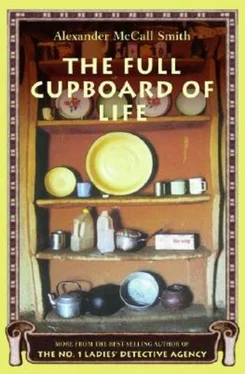Alexander Smith - The Full Cupboard of Life
Здесь есть возможность читать онлайн «Alexander Smith - The Full Cupboard of Life» весь текст электронной книги совершенно бесплатно (целиком полную версию без сокращений). В некоторых случаях можно слушать аудио, скачать через торрент в формате fb2 и присутствует краткое содержание. Жанр: Триллер, на английском языке. Описание произведения, (предисловие) а так же отзывы посетителей доступны на портале библиотеки ЛибКат.
- Название:The Full Cupboard of Life
- Автор:
- Жанр:
- Год:неизвестен
- ISBN:нет данных
- Рейтинг книги:4 / 5. Голосов: 1
-
Избранное:Добавить в избранное
- Отзывы:
-
Ваша оценка:
- 80
- 1
- 2
- 3
- 4
- 5
The Full Cupboard of Life: краткое содержание, описание и аннотация
Предлагаем к чтению аннотацию, описание, краткое содержание или предисловие (зависит от того, что написал сам автор книги «The Full Cupboard of Life»). Если вы не нашли необходимую информацию о книге — напишите в комментариях, мы постараемся отыскать её.
The Full Cupboard of Life — читать онлайн бесплатно полную книгу (весь текст) целиком
Ниже представлен текст книги, разбитый по страницам. Система сохранения места последней прочитанной страницы, позволяет с удобством читать онлайн бесплатно книгу «The Full Cupboard of Life», без необходимости каждый раз заново искать на чём Вы остановились. Поставьте закладку, и сможете в любой момент перейти на страницу, на которой закончили чтение.
Интервал:
Закладка:

Alexander McCall Smith
The Full Cupboard of Life
The fifth book in the No 1 Ladies Detective agency series, 2003
This book is for Soula Ross
and
Vicky Taylor
CHAPTER ONE
PRECIOUS RAMOTSWE was sitting at her desk at the No. 1 Ladies’ Detective Agency in Gaborone. From where she sat she could gaze out of the window, out beyond the acacia trees, over the grass and the scrub bush, to the hills in their blue haze of heat. It was such a noble country, and so wide, stretching for mile upon mile to brown horizons at the very edge of Africa. It was late summer, and there had been good rains that year. This was important, as good rains meant productive fields, and productive fields meant large, ripened pumpkins of the sort that traditionally built ladies like Mma Ramotswe so enjoyed eating. The yellow flesh of a pumpkin or a squash, boiled and then softened with a lump of butter (if one’s budget stretched to that), was one of God’s greatest gifts to Botswana. And it tasted so good, too, with a slice of fine Botswana beef, dripping in gravy.
Oh yes, God had given a great deal to Botswana, as she had been told all those years ago at Sunday school in Mochudi. “Write a list of Botswana’s heavenly blessings,” the teacher had said. And the young Mma Ramotswe, chewing on the end of her indelible pencil, and feeling the sun bearing down on the tin roof of the Sunday school, heat so insistent that the tin creaked in protest against its restraining bolts, had written: (1) the land; (2) the people who live on the land; (3) the animals, and specially the fat cattle. She had stopped at that, but, after a pause, had added: (4) the railway line from Lobatse to Francistown. This list, once submitted for approval, had come back with a large blue tick after each item, and the comment written in: Well done, Precious! You are a sensible girl. You have correctly shown why Botswana is a fortunate country .
And this was quite true. Mma Ramotswe was indeed a sensible person and Botswana was a fortunate country. When Botswana had become independent all those years ago, on that heart-stilling night when the fireworks failed to be lit on time, and when the dusty wind had seemed to augur only ill, there had been so little. There were only three secondary schools for the whole country, a few clinics, and a measly eight miles of tarred road. That was all. But was it? Surely there was a great deal more than that. There was a country so large that the land seemed to have no limits; there was a sky so wide and so free that the spirit could rise and soar and not feel in the least constrained; and there were the people, the quiet, patient people, who had survived in this land, and who loved it. Their tenacity was rewarded, because underneath the land there were the diamonds, and the cattle prospered, and brick by brick the people built a country of which anybody could be proud. That was what Botswana had, and that is why it was a fortunate country.
Mma Ramotswe had founded the No. 1 Ladies’ Detective Agency by selling the cattle left her by her father, Obed Ramotswe, a good man whom everybody respected. And for this reason she made sure that his picture was on the office wall, alongside, but slightly lower than, the picture of the late President of Botswana, Sir Seretse Khama, paramount chief of the Bangwato, founding president of Botswana, and gentleman. The last of these attributes was perhaps the most important in Mma Ramotswe’s eyes. A man could be a hereditary ruler, or an elected president, but not be a gentleman, and that would show in his every deed. But if you had a leader who was a gentleman, with all that this meant, then you were lucky indeed. And Botswana had been very lucky in that respect, because all three of her presidents had been good men, gentlemen, who were modest in their bearing, as a gentleman should be. One day, perhaps, a woman might become president, and Mma Ramotswe thought that this would be even better, provided, of course, that the lady in question had the right qualities of modesty and caution. Not all ladies had those qualities, Mma Ramotswe reflected; some of them being quite conspicuously lacking in that respect.
Take that woman who was always on the radio-a political woman who was always telling people what to do. She had an irritating voice, like that of a jackal, and a habit of flirting with men in a shameless way, provided that the men in question could do something to advance her career. If they could not, then they were ignored. Mma Ramotswe had seen this happening; she had seen her ignoring the Bishop at a public function, in order to talk to an important government minister who might put in a good word for her in the right place. It had been transparent. Bishop Theophilus had opened his mouth to say something about the rain and she had said, “Yes, Bishop, yes. Rain is very important.” But even as she spoke, she was looking in the direction of the minister, and smiling at him. After a few minutes, she had slipped away, leaving the Bishop behind, and sidled up to the minister to whisper something to him. Mma Ramotswe, who had watched the whole thing, was in no doubt about what that something had been, for she knew women of this sort and there were many of them. So they would have to be careful before choosing a woman as president. It would have to be the right sort of woman; a woman who knew what hard work was and what it was like to bear half the world upon your shoulders.
On that day, sitting at her desk, Mma Ramotswe allowed her thoughts to wander. There was nothing in particular to do. There were no outstanding matters to investigate, as she had just completed a major enquiry on behalf of a large store that suspected, but could not prove, that one of its senior staff was embezzling money. Its accountants had looked at the books and had found discrepancies, but had been unable to find how and where the money had disappeared. In his frustration at the continuing losses, the managing director had called in Mma Ramotswe, who had compiled a list of all the senior staff and had decided to look into their circumstances. If money was disappearing, then there was every likelihood that somebody at the other end would be spending it. And this elementary conclusion-so obvious really-had led her straight to the culprit. It was not that he had advertised his ill-gotten wealth; Mma Ramotswe had been obliged to elicit this information by placing temptation before each suspect. At length, one had succumbed to the prospect of an expensive bargain and had been able to offer payment in cash-a sum beyond the means of a person in such a position. It was not the sort of investigation which she enjoyed, because it involved recrimination and shame, and Mma Ramotswe preferred to forgive, if at all possible. “I am a forgiving lady,” she said, which was true. She did forgive, even to the extent of bearing no grudge against Note Mokoti, her cruel former husband, who had caused her such suffering during their brief, ill-starred marriage. She had forgiven Note, even though she did not see him any more, and she would tell him that he was forgiven if he came to her now. Why, she asked herself, why keep a wound open when forgiveness can close it?
Her unhappiness with Note had convinced her that she would never marry again. But then, on that extraordinary evening some time ago, when Mr J.L.B. Matekoni had proposed to her after he had spent all afternoon fixing the dispirited engine of her tiny white van, she had accepted him. And that was the right decision, for Mr J.L.B. Matekoni was not only the best mechanic in Botswana, but he was one of the kindest and most gracious of men. Mr J.L.B. Matekoni would do anything for one who needed help, and, in a world of increasing dishonesty, he still practised the old Botswana morality. He was a good man, which, when all is said and done, is the finest thing that you can say about any man. He was a good man.
Читать дальшеИнтервал:
Закладка:
Похожие книги на «The Full Cupboard of Life»
Представляем Вашему вниманию похожие книги на «The Full Cupboard of Life» списком для выбора. Мы отобрали схожую по названию и смыслу литературу в надежде предоставить читателям больше вариантов отыскать новые, интересные, ещё непрочитанные произведения.
Обсуждение, отзывы о книге «The Full Cupboard of Life» и просто собственные мнения читателей. Оставьте ваши комментарии, напишите, что Вы думаете о произведении, его смысле или главных героях. Укажите что конкретно понравилось, а что нет, и почему Вы так считаете.












